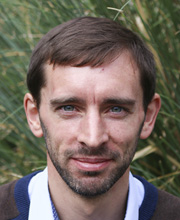Tom Sizmur

-
+44 (0) 118 378 8913
-
Professor
-
Programme Director for BSc Environmental Science
-
Leader of the Soil Biogeochemistry Group
Areas of interest
- Understanding mechanistically why some regenerative agriculture practices ‘work’
- Developing new strategies for storing carbon in soils
- The impact of environmental change on soil biogeochemical cycles
- Food system thinking for human health and environmental sustainability
- Exploiting ‘low hanging fruit’ opportunities for improving sustainable soil management
Postgraduate supervision
Tom is happy to discuss proposals for postdoctoral fellowships or PhD studentships in any area of soil biogeochemistry, but particularly those interested in soil carbon dynamics and the improvement of soil health through the incorporation of organic matter.
He currently supervises the following postdoctoral researchers and PhD students:
- Dr Gabriel Yesuf: FoodSEqual- "Co-production of healthy, sustainable food systems for disadvantaged communities" funded by a BBSRC Transforming the Food System Grant
- Lottie Hawkins: Exploring the role of biochar to increase the sustainability of UK farming businesses. Funded by the Wilkie Calvert PhD Studentship
- Christina Van Midden (Cranfield University) Manipulating the microbial legacy response to organic amendments for soil nutrient bioavailability. Funded by a BBSRC FoodBioSystems studentship with CASE
- Ellie Barbrook: Optimizing soil nitrogen (N) in babyleaf salad crops for sustainable crop production. Funded by a BBSRC studentship with CASE support from the Waitrose Agronomy Group
- Sam Kehoe: Anaerobic fermentation of food waste to connect fork to farm and store carbon in soils. Funded by a BBSRC FoodBioSystems studentship with CASE support from Agriton
- Hanqing Lin: Carbon Use Efficiency in Metal Contaminated Soils. Self funded
Teaching
Tom has convened modules in Earth Lab (Year 1), Environmental Chemistry (Year 2), and Environmental Pollution (Year 3) for the BSc Environmental Science Programme and modules on Environmental Consultancy, Laboratory Analysis of Soils and Pollutants and a Field Class for the MSc Environmental Management programme. He has also contributed to other modules, including an MSc module that focuses on Pollutant Behaviour in the Environment and BSc modules on Data Environment and Research Training for Geography and Environmental Science students.
Every year Tom supervises a number of BSc and MSc dissertation research projects.
Research centres and groups
Background
Tom’s research interests span the biogeochemistry of soils in agricultural, natural, and polluted environments. His research interests particularly relate to the benefits that can be obtained from the incorporation of crop residues and other organic amendments into soils to recycle nutrients and feed soil organisms.
While there is widespread acceptance that increasing soil organic matter is a laudable aim and that organic amendments are a tractable means to achieve this aim, the objective of Tom’s research is to identify or develop strategies whereby the maximum possible benefits are obtained by the judicious application of situation appropriate amendments. Strategies under investigation include intercropping cereals and legumes, the application of biochar and compost to tropical soils, and the use of cover crop green manure mixtures that provide benefits that are greater than the sum of the parts.
Tom is an Editor for Environmental Toxicology and Chemistry, a member of the British Ecological Society and Commonwealth Scholarship Commission Peer Review Colleges.
For more information on Tom's research, please see his personal webpage.